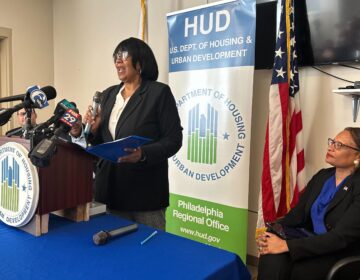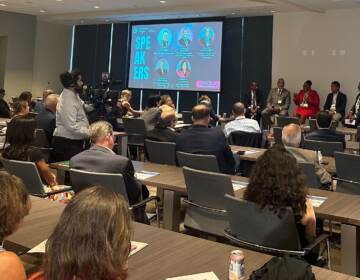These Black developers want to show by example how to make it in a difficult, expensive industry
Bryheim Murray, of BKP group, recognizes that it’s a white industry and, because of that, it’s inherently harder for Black people to get involved.
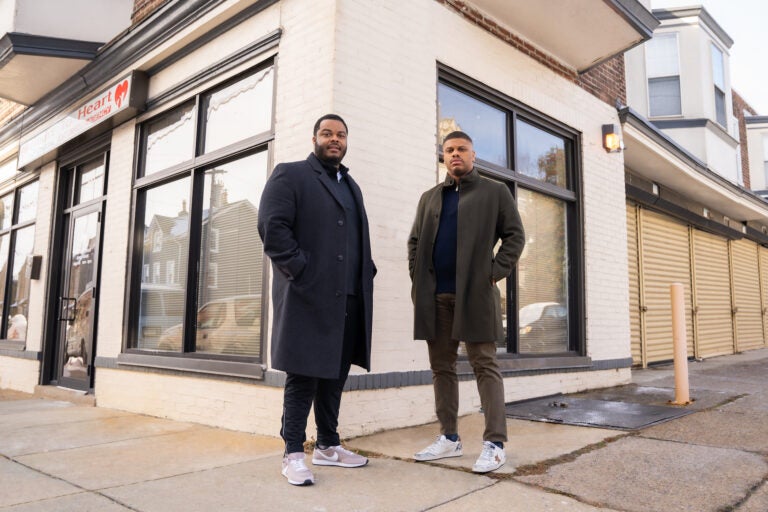
Bryheim Murray and Kyle Easley, partners and owners of BKP Development Group. (Photo by Ritchie King)
Bryheim Murray and Kyle Easley are trying to break into the development industry. In a lot of ways, they have already. It’s been five years, and they regularly get more work and projects. But they are trying to get bigger.
They’ve had a pretty impressive start. So far, their development group, BKP, has seven projects under its belt.
Their latest, in Brewerytown, is a three-bedroom, 2.5-bathroom corner townhouse they call Taney St.
Their next project is their most ambitious yet, in Olde Kensington: They expect to break ground in January on a five-story, 20-unit apartment complex with commercial space, five parking spots, 15 bicycle spaces, a dog park, and a rooftop terrace. It will be the largest project they’ve done so far, named “The Cecil” after the late Cecil B. Moore, the Philadelphia civil rights activist.
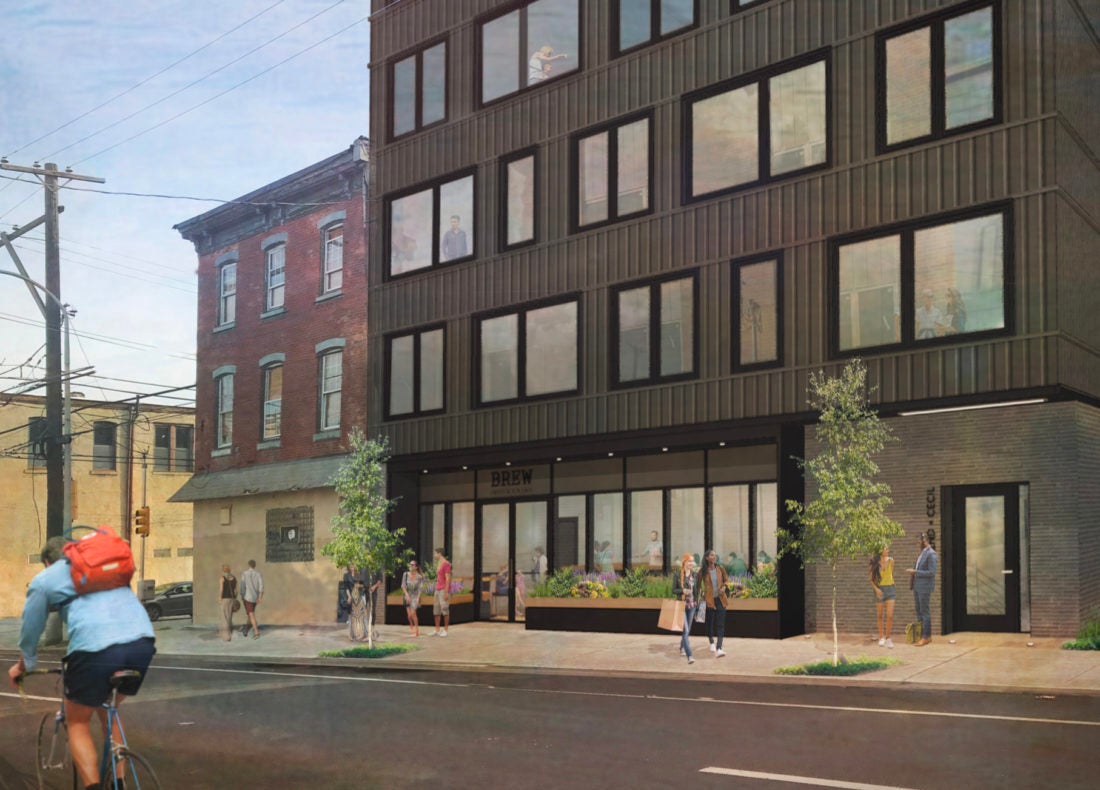
The duo have over 200 units in the pipeline to be developed, with 50 of those units breaking ground over the next six months.
Murray and Easley have been in business for five years. Both are from Philadelphia: Murray is from North Philadelphia; Easley is from Frankford. Murray was studying at Temple and Easley was at Howard Law when they met.
Murray has always been curious about real estate, and he didn’t have to go far to see changes. He attended West Catholic High School in West Philly, and during his commute he saw “hundreds of vacant properties.”
“Now, these buildings are now structures with people living in them, and I just found that fascinating and I wanted to be a part of that,” Murray said.
Easley had a similar fascination. When he would travel downtown from Frankford, one of his favorite things was looking at how massive the buildings were.
“I couldn’t really fathom the idea of how someone could own something so big, so valuable,” he said. “I thought it would be cool to one day own something like that myself.”
It wasn’t till college that he began taking real estate classes and fully immersed himself in what the business entailed. It was then he thought he could participate in the industry.
All Black everything
The duo said having a Black staff on all levels was always intentional. On top of the group being Black owned, they use Black contractors, Black lawyers, and Black interior designers.
“We need to help bring our people up, we need to hire our folks,” Easley said. Both men said they haven’t lacked anything for doing so either.
Murray said he recognizes, too, that this is a white industry and because of that, it’s inherently harder for Black people to get involved. He said he noticed that a lot of his counterparts in the business work with people who are familiar to them, and that usually results in fewer Black people getting an opportunity.
“Being entrepreneurs ourselves, we understand the difficulties of somebody giving you a shot,” Murray said.
Andrea Gosfield is the company’s lawyer. She said the hook for her was that Easley and Murray branded themselves as developers who want to build things for people, particularly Black people, to enjoy.
“We can be proud of inviting folks into those spaces and not merely displacing existing Philadelphia residents purely for financial gain,” she said.
Gosfield said that what sets BKP apart from other clients is that the group sees the community as a vital part of the developing process. By contrast, her previous clients saw the community “as a hoop to go through to get to their goal of profit-making.”
She said it was refreshing to see things be done differently.
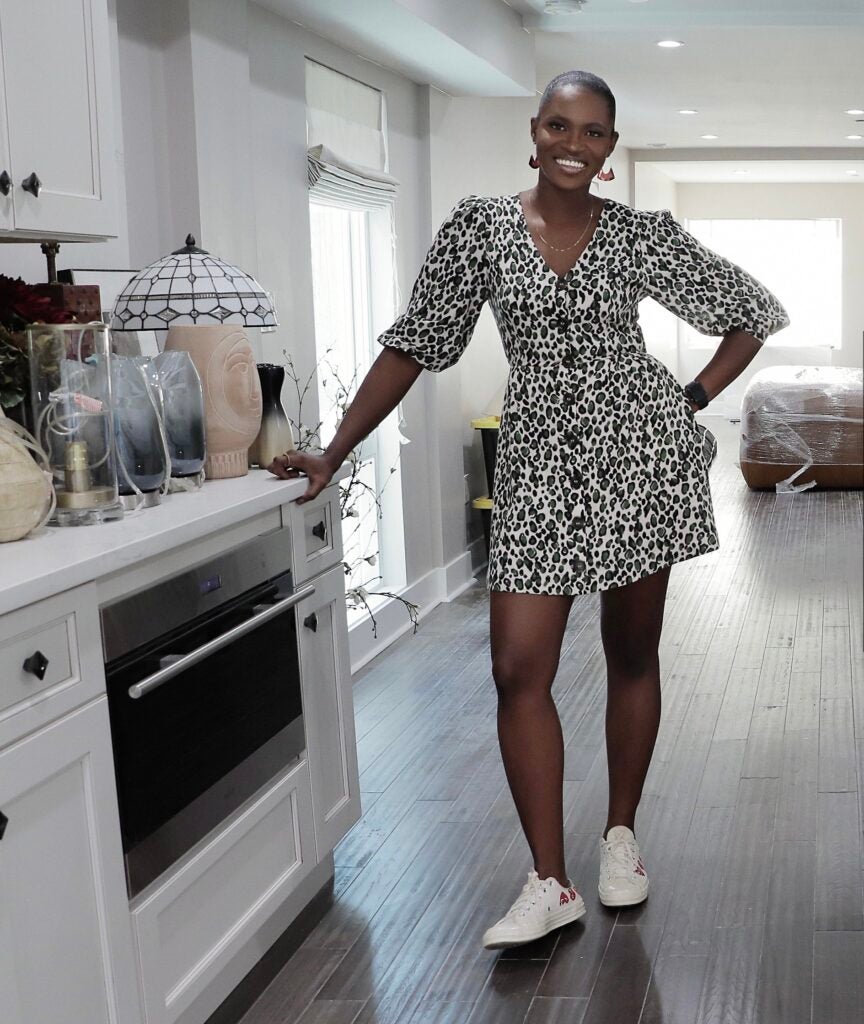
Remul Johnson is their main interior designer. She said the benefit of working under Black developers is that she can incorporate more Black art when staging the properties.
“We’re able to incorporate a lot of Black artists,” she said. “I always try to put Black faces, but it depends on the client’s needs, but the guys are very pro-Black.”
Angelique Hunter is their head of construction and she takes pride in being both Black and a woman in the role. Nationally, women make up 9.1% of the construction workforce. Black people make up 6%. On top of that, she is always trying to recruit others who look like her.
“I intentionally look for opportunities for other young Black men or Black women in this industry,” she said.
Being conscious of community and giving back
When Murray graduated high school, he spent two years in Virginia. When he came back, that’s when he witnessed the drastic changes Temple University made to North Philadelphia.
When he returned to his neighborhood after two years, he thought it was cool. He didn’t see as much blight as he remembered growing up. There were shops, restaurants, and other amenities. But it didn’t take long for him to realize that some of his neighbors were also disappearing.
“As developers, I think it’s our responsibility to be thoughtful on how our built spaces can benefit the people who are from these neighborhoods,” Easley said.
The group makes a point to include community public space in their projects that both the public and tenants can share.
Other ways they said they give back is through donations. Over the past year, the group has donated to Black Lives Matter, the Philadelphia Bail Fund, and American Civil Liberties Union.
Community is important enough for them to hire a community outreach specialist who often coordinates events.
“Being Black developers, we didn’t want any other company to outdo us when it comes to philanthropy and charity,” he said. “We have resources so we have to ramp up our community efforts.”
The latest example was organizing a toy and food drive Tuesday in partnership with People’s Emergency Center and Philabundance to benefit more than 200 families.
Their goal is to provide mixed-income housing primarily. The duo acquired a mixed-use building in Germantown last month that offers affordable housing units. Thirty percent are set aside for affordable housing, and the group plans on replicating that in future projects.
For the units that are not for affordable housing, the average rent is about $900. At The Cecil, the average rents will be about $1,300 and it’s mostly two-bedrooms. The cost of the affordable housing vary because it has Section 8 tenants.

Challenges
“I don’t have a rich uncle,” Murray joked. “So it’s more of a challenge to try to participate in some of these larger commercial deals.”
Getting capital has been one of the biggest hurdles, they said. They are always looking through their own networks to find potential investors. Raising money is an obstacle, but they have managed so far.
They bought the Germantown property for $600,000 and had to put in another $50,000 for repairs.
For their biggest project to date, The Cecil, the total cost is a little under $4 million.That includes construction costs, what they originally paid for the lot, and architecture and legal costs. The Cecil required the most fundraising.
Yet this year hasn’t always been kind. The pandemic forced them to sell one of their properties, Taney St. The original plan was to keep it rented out, to be able to retain it in their portfolio and then pass it on to their children.
“The goal of the pandemic was just to survive,” Easley said.
Still, they’re optimistic. They at least made a profit. For Taney St, they put in about $280,000 in total and sold it for $395,000.
They have 200 units planned to be developed, and 50 of them will break ground within the next six months.
The partners want to expand and continue getting more projects, but the real goal is to show that they are able to do it.
“I want my people to be able to enjoy these spaces and know that people that looked like them participated in it,” Easley said. “And that’s whether it’s someone designing the space, whether it was the attorney putting the deal together, or whether it was the ownership.”
Easley said he just wants Black people to know that they can do it.
“It’s not rocket science, but the industry kind of tells us that because it’s too hard to get into,” he said.

Subscribe to PlanPhilly
WHYY is your source for fact-based, in-depth journalism and information. As a nonprofit organization, we rely on financial support from readers like you. Please give today.





